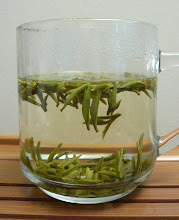I think this is a lovely little cake. It has the charming Jing Mai aroma, almost no bitter taste and very light astringency which dissolves instantly.
It is a 100g small cake. Unlike most cakes of its size, this cake is made by manually compressing with a stone mill. The cake is even looser than most manually compressed large cakes and is very easy to dissemble. The loosely compressed cakes may not be suitable for decades of aging. But it's quite drinkable now anyway.
What's good about it being loose is that one doesn't have to crush a lot of leaves when prying on the cake. The cake is composed of consistent leaves from old trees. It's nice to get them as almost whole leaves in brewing.
This cake is very inexpensive. Some of my friends say, unknown small factory inexpensive products of arbor tree or ancient tree can rarely be good... don't buy them... I followed the advice. I didn't buy them. This one was given to me for free and I love free stuff! :-D The manufacturer said, "If you hire someone to do marketing for you, you've got to spend money. If you hire a designer to make your product or store look good, you've got to spend money. If you put on advertisement, you've got to spend money. If you hire people to write good things about your products, you've got to spend money. Then, I thought, instead of doing any of the above, I would rather give up some money by giving tea for free to people so more people will know my products." That's how I got this little cake. And I like the manufacturer's philosophy. Recently, Dayi has put on its smart looking commercial on the major TV station (and the most expensive one) of China, which is said to be a 50 million rmb ($7.5M) deal. We've got to have some puerh manufacturers that give us free tea instead of letting us pay the expensive TV advertising bill.
And this little cheap unknown cake, I ended up liking it a lot. Not that I would start buying unknown cheap little cakes. But I can surely consider buying more after tasting some sample.
The cake is claimed to be a product of ancient tree (but ancient tree in Yunnan can mean any tree of 100 years or older, not necessarily "ancient-ancient"), and from early spring (there are indeed quite a few buds and spring twigs). Still I am not sure of its age-ability (but at least, after its first 3 years, the cake stays well). And of course arbor trees or ancient trees can have different conditions and different levels of rarity. But the price for such a cake surprises me. Anyway, the quality of this little cake is more than reasonable for its price. And I know I've yet to experience more to fully understand why there is such huge price difference between teas, or, in other words, why such huge quality difference between teas of the same price range.
六堡茶道美学煮茶
3 years ago






































9 comments:
That story about the Dayi commercial really saddens me ... Makes me prefer small producers all the more, I mean knowing that the price of stuff from big factory is so much from overhead, while the tea quality recedes in the equation.
Would you mind letting us know where this 2008 Jing Mai Mini Cake can be bought? I realy love things like that ...
Martin
I recently bought this cake off ebay for $1. http://cgi.ebay.com/2008yr-PingXiWang-QiaoMu-Puer-Bing-tea-357g-cake-Raw-/300540919261?pt=LH_DefaultDomain_0&hash=item45f9a27ddd
It was perfectly drinkable. Very mellow and I was quite impressed.
I think like you say not all producers have big budgets and some of the fakes seem just as good as the originals.
Hi Martin, if you are interested, I can send you some of this tea to taste before buying. I personally still hesitate on whether to buy more of it, since shipping may cost more than the tea. But if you would like to buy, I can help you arrange purchase from China.
Dayi has caused quite some controversies in recent years. But some people are advocates of Dayi, because Chinese tea industry lacks big corporation leaders, and Dayi can be one. Some of Dayi's approaches have been commercially very successful.
Cloud Mountain, I guess even the good fakes are usually not as good as original, but possibly better than some other teas. Imagine, if all talented fake makers go to make legitimate tea, maybe they can make even better tea.
Hi Cloud Mountain, I took a look at the ebay link. It looks very much like a legitimate product, not a fake. It's probably an inexpensive tea (and the seller make small profit out of the shipping charge, to avoid ebay transaction charge). Or the seller put it on auction with low price to attract more buyers.
Well there not making any profit of the sale price. Do you have any idea on the manufacture of the tea?
I had never heard of this manufacturer (the line at the bottom of the cake is their name). But when searching online, I did find their products here and there. Any cake of that size will be more than $1, but there are a lot of cakes in the range of $3-5.
I really thought about that argument, that "Chinese tea industry lacks big corporation leaders". This being fairly abstract, I'd be interested what the Dayi advocates think of in more specific terms?
I'd also be interested in your opinion what market relationship/ dynamic there is between such big companies and smaller companies who go probably more for a traditional, artisanal attitude. Maybe Yuan Nian Tea Company can be seen as an example. Will they co-exist in different market niches, or do the big-modern ones suck up everything?
Martin
Hi Martin, Alex wrote a blog about big companies recently
http://cazort.blogspot.com/2011/03/what-tea-brands-does-unilever-own-and.html
I think it's a very interesting topic and also made some comments there. I have been thinking of this topic for a long time, but am very slow in writing.
I think there are many factors that cause people to long for big tea companies in China. One factor is the overall admiration among some people to gigantic corporations. Another factor is, as a big tea country, China hasn't made as much money in international tea market as people would expect, and many people feel resentful about it.
Although I don't like some behaviors of Dayi, I have to say, I would rather to see it grow big than seeing Lipton growing big in China. Although I don't have the data, I suspect Lipton is the tea company that spends most money on advertisement in China.
So far I think puerh is one of the few types of high quality tea that allow big companies to grow. Many other teas require small-scale processing to make high quality tea. There are also a lot of factors to consider when comparing big and small puerh factories, each has their own strength. So probably they can co-exist for a long time, but maybe there is space for only a few very big companies.
Thanks you guys for your thoughtful discussion! That puts me into thinking more about a few topics!
Post a Comment